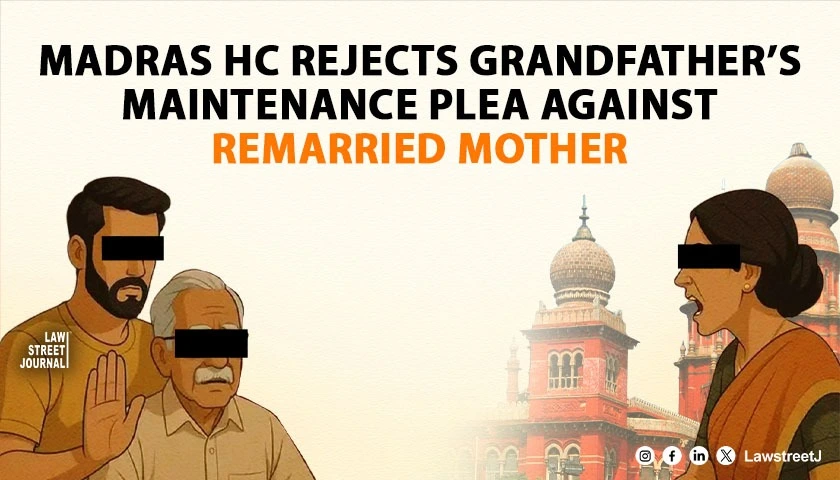Chennai: The Madras High Court has dismissed a revision petition filed by a paternal grandfather seeking maintenance for his minor grandson from the child’s remarried mother, holding that such proceedings amount to judicial harassment and misuse of law when the child’s father—who is the natural guardian—is alive, capable, and bound by his undertaking in a mutual consent divorce decree to maintain the child.
Justice L. Victoria Gowri delivered strong observations condemning the attempt to disturb a woman’s peaceful remarried life, describing the case as one that “epitomizes how modern domestic complexities can distort familial bonds,” where “a minor child has been thrust into the vortex of litigation, not to protect his welfare, but as an instrument to vent the latent animosity of an embittered father-in-law against his divorced and peacefully remarried daughter-in-law.”
The court addressed CRL RC(MD) No.1148 of 2024, filed by the minor through his paternal grandfather, challenging an order dated December 21, 2023, of the Family Court, Karur, which dismissed a maintenance petition under Section 125 CrPC filed against the child’s mother.
The marriage was solemnized on March 8, 2009, and a son was born on July 9, 2010. After differences arose, both parties filed H.M.O.P. No.118 of 2013 seeking dissolution by mutual consent. By order dated February 14, 2014, the marriage was dissolved with specific terms: custody of the minor would vest with the father; the father would maintain the child; and the mother would not claim any maintenance from her former husband.
Following the divorce, both biological parents remarried and began living their independent lives. The minor lived under the care of his paternal grandparents at Karur, while the father, employed with the Airport Authority of India and earning ₹1,00,000 per month, paid monthly maintenance, deposited ₹1,60,000 in the child’s name, and maintained a life insurance policy for the child.
The Family Court dismissed the maintenance petition holding that the paternal grandfather, not being the natural guardian, had no locus standi to maintain such a petition in the absence of an appointment as guardian by a competent court, especially when the natural guardian (the father) was alive and financially capable.
Justice Victoria Gowri strongly criticized the proceedings, observing:
“What ought to have been a matter of parental care has been converted into a tool of vengeance, where the estranged husband, instead of acting with responsibility, has chosen to act through his father, making his own minor son a mere pawn in their continuing matrimonial discord.”
The Court emphasized the need for judicial vigilance to protect women’s rights, noting:
“This Court cannot remain oblivious to the persistent vulnerabilities faced by women, who, even after lawfully resolving their marital disputes and rebuilding their lives with dignity, are often dragged back into the shadows of hostility under one guise or another.”
On the legal issue of locus standi, the Court held that Section 125 CrPC confers rights upon certain categories of dependents. In the case of a minor, a petition must ordinarily be instituted by or through the natural guardian, who under Section 6 of the Hindu Minority and Guardianship Act, 1956, is the father, and after him, the mother.
The Court found that the grandfather lacked legal standing, observing:
“The paternal grandfather, unless appointed as a guardian by a competent Court under the Guardians and Wards Act, 1890, cannot assume the capacity of a natural guardian or file legal proceedings representing the child. Therefore, the Family Court’s conclusion that the grandfather lacked locus standi is legally sound.”
On the effect of the mutual consent decree, the Court stressed:
“Such an arrangement, once accepted and recorded by a competent Court, attains finality. Neither party can, under the guise of a new proceeding, indirectly modify or nullify its effect.”
The Court strongly condemned the underlying motive, noting that the proceedings were “in substance an attempt to disturb the calm and dignity of her new matrimonial life,” and that using the child as an instrument to reopen past marital discord amounted to judicial harassment and undermined the principle of peaceful co-parenting.
The Court further articulated the doctrine of co-parenting after divorce, observing:
“True co-parenting does not consist in litigating against one another but in ensuring that the child’s welfare is secured through agreed means.”
On the constitutional protection of a remarried woman’s life and dignity, the Court held:
“The respondent–mother’s remarriage, stability, and peace are constitutionally protected aspects of her right to life and dignity under Article 21 of the Constitution of India. Courts cannot permit former in-laws to intrude into that privacy by instituting repeated litigations under the pretext of child welfare when the legal guardian is alive and responsible.”
In conclusion, the Court held that the revision was a misconceived attempt by the paternal grandfather to disturb the respondent’s settled and peaceful family life, despite the fact that the biological father—his own son—was alive, capable, and bound by his undertaking in the mutual consent decree to maintain the child.
The Court deprecated such misuse of law, reiterating that maintenance provisions cannot be used to reopen closed chapters of matrimonial litigation and that co-parenting after divorce must be guided by cooperation, not confrontation.
The criminal revision case was dismissed, and the Family Court’s order dated December 21, 2023, was upheld.




![TN Medical Council declares change of gender identity of LGBTQIA+ as misconduct [Read Notification]](/secure/uploads/2022/12/lj_5268_5cebb05a-97fb-40fb-8045-25cdf8f4207a.jpg)
![Madras High Court Directs Tamil Nadu Government to Ensure Quota for Transgenders in Local Body Elections [Read Order]](/secure/uploads/2023/08/lj_2507_7a03d113-08b1-4670-b6fb-9058aee481d0.jpg)
![Anti Corruption sleuths acted like "puppets in The Muppet Show", HC notice to ex TN CM in disproportionate assets case [Read Order]](/secure/uploads/2023/09/lj_8675_7b37fc02-1b2d-4f4a-9816-3df20545b37e.jpg)




